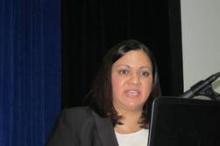SAN ANTONIO – Roughly one in five women with heavily pretreated, advanced triple-negative breast cancer experienced a durable response to monotherapy using the novel immune checkpoint inhibitor pembrolizumab in a small proof-of-concept study.
“The acceptable safety and tolerability profile coupled with the promising antitumor activity seen in this very early trial support the further development of pembrolizumab in patients with advanced triple-negative breast cancer,” Dr. Rita Nanda declared in presenting the findings of the KEYNOTE-012 study at the San Antonio Breast Cancer Symposium.
The phase Ib study comprised 32 women with advanced triple-negative breast cancer, all with PD-L1-positive tumors. They were placed on pembrolizumab (Keytruda) at a dose of 10 mg/kg administered intravenously every 2 weeks. Pembrolizumab is a humanized IgG4 monoclonal antibody that binds to the PD-1 receptor with high affinity, thereby switching off PD-1-mediated inhibition of the antitumor immune response.
This was a group of patients with disease progression despite extensive earlier treatments. Median survival is about 1 year from the time of diagnosis of metastatic triple-negative breast cancer, and since receiving that diagnosis nearly half of the study participants had received three or more lines of chemotherapy for metastatic disease. So their median life expectancy at enrollment in KEYNOTE-012 was just a few months, making the durability of the responses seen in the handful of pembrolizumab responders all the more impressive, said Dr. Nanda, a medical oncologist at the University of Chicago.
The overall response rate in the 27 evaluable patients was 18.5% using RECIST version 1.1 criteria with central review. One patient had a complete response, four others had a partial response. Another seven had stable disease. One-third of patients showed tumor shrinkage upon imaging.
The median time to response was 18 weeks. At a median 9.9 months of follow-up, the median duration of response had not yet been reached. Three of five responders remained on treatment for 48 weeks or longer, while the two who discontinued pembrolizumab did so at 40 weeks. Median progression-free survival was 1.9 months, with a progression-free survival rate at 6 months of 23%.
While 56% of patients experienced one or more treatment-related adverse events, the vast majority of these were mild and easily managed without treatment discontinuation. However, four patients experienced grade 3 anemia, aseptic meningitis, headache, or pyrexia, and a fifth who had rapidly progressive disease developed fatal disseminated intravascular coagulation.
A proprietary Merck assay for PD-L1 showed that 58% of patients with advanced triple-negative breast cancer screened as a prelude to the study were deemed to have PD-L1-positive tumors. But investigators saw no correlation between the degree of PD-L1 positivity and response to treatment, so it remains unclear how to identify beforehand the patient subgroup likely to respond to pembrolizumab.
A phase II study is planned for early 2015. Tumor biopsies will routinely be obtained in this and other future trials so investigators can search fresh tissue for useful biomarkers; this was not done in KEYNOTE-012.
Plans are afoot to study pembrolizumab in patients with other subtypes of advanced breast cancer. Pembrolizumab will be assessed in combination with standard therapies, albeit not with agents requiring concomitant corticosteroid therapy, which would likely inhibit pembrolizumab’s ability to stimulate the immune system, Dr. Nanda explained.
The pembrolizumab study results received an enthusiastic response.
“I think everyone continues to be quite excited about immunotherapy in breast cancer. This study shows what we’ve seen in several other studies in other tumor types: a small portion of patients may respond, and for those that do there tends to be a long-term response with durability that we don’t see often with other therapies,” said Dr. Jennifer Litton of MD Anderson Cancer Center, Houston, who chaired a press conference highlighting the KEYNOTE-012 results.
Dr. Edith A. Perez observed that the conventional wisdom has long been that breast cancer is not typically a disease amenable to targeting with immune-modulating therapy. But the conventional wisdom was wrong.
“I’m very grateful that now we have the first proof-of-principle study showing that in a group of patients with refractory advanced metastatic breast cancer there was a signal of activity in response to immune-modulating therapy,” said Dr. Perez, deputy director at large for the Mayo Clinic Cancer Center and professor of medicine at the Mayo Clinic in Jacksonville, Fla.
“These patients have so few options that to see this glimpse of activity provides me with a lot of enthusiasm,” she added.
Discussant Mary L. Disis offered a rousing argument for moving on quickly to mount studies evaluating pembrolizumab in combination regimens with standard therapies. Dr. Disis noted that when pembrolizumab has been studied as single-agent therapy for kidney, gastric, head and neck, and lung cancers as well as in melanoma, the overall response rates have been 20%-34%.


